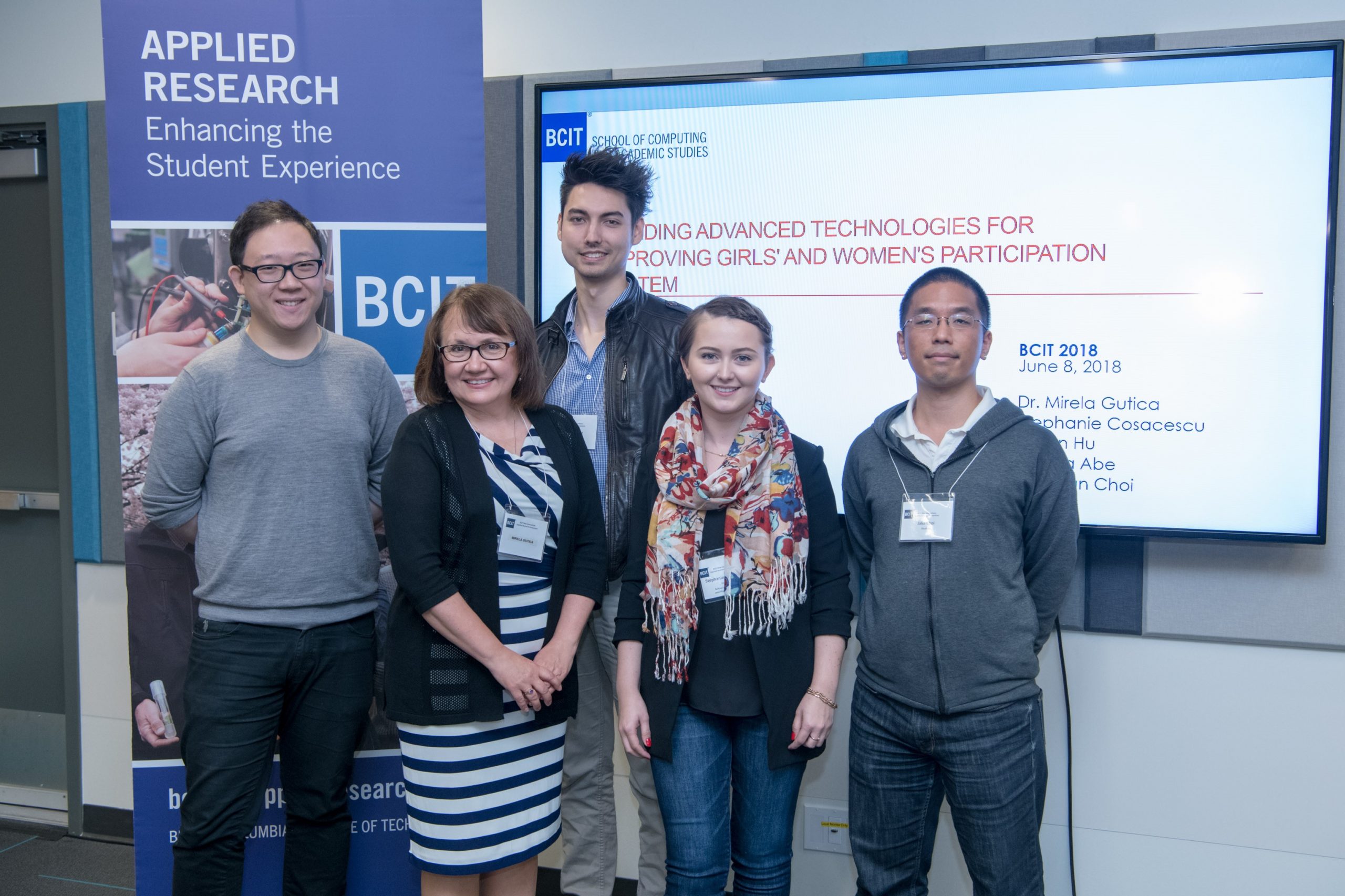How a BCIT researcher is helping bridge the gender gap in STEM
Women only make up 30% of the world’s researchers and 28% of the STEM workforce. While there is an awareness that the gender gap exists in most STEM fields, it’s important to recognize and break the barriers that are limiting women from entering a career in STEM. BCIT researcher and School of Computing and Academic Studies faculty member Dr. Mirela Gutica is part of the 41% of researchers at BCIT who are women and she is addressing this gender gap issue through her research at BCIT.
The world needs more girls and women in STEM fields
With a specialization in Technology Studies, Dr. Guitca’s research focuses on reducing the gender gap in STEM experience. Specifically, her research aims to identify motivational and challenging factors that influence female students to pursue computer science post-secondary education. As well as proposing strategies that could encourage more high-school girls to pursue an education in STEM-related fields, such as computer science.
In one startling historical example, an absence of women in the design process of cars led to seat belts and airbags that were intended for male passengers. Only years later were these products tested on non-male subjects and re-designed for the diverse frames of women, the elderly, and children. In this case, lack of diversity in the research process contributed to oversights and mistakes that costed lives.
“When I was in high school I was passionate about many subjects including arts, design, mathematics, and sciences. My choice to study computer science was based on the fact that computer science encompasses all of the above,” says Dr. Mirela Gutica. “I love my students and I am inspired and motivated by their creativity, interest, and passion. Yet I do wish to have more diversity in my classroom.”

Dr. Mirela Gutica’s Research: Reducing the Gender Gap
Dr. Gutica’s first study comprised in-depth interviews with 21 current students and recent graduates of computing programs. She and her team found that several attainment–related aspects presented differences between males and females including being subjected to stereotypical views, having less confidence, lack of role models, and even being discouraged by family members and friends. Statistics Canada reported that women’s lower enrolments in STEM programs at the start of their postsecondary education are responsible for the gender gap.
“However, my study revealed that we also have an opportunity to improve retention if we can change the post-secondary experience for female students by making sure they don’t feel isolated or unsupported,” explains Dr. Gutica. “I’m really pleased to see things like a Women in Computing club which is now active at BCIT Computing.”
In the second study, Dr. Gutica conducted coding workshops with 47 (41 girls) high school students from local high schools. The workshops were designed to include activities that addressed aspects recognized in the previous study as having importance for motivating girls, more precisely aimed to reduce stereotypical views, increase confidence and offer opportunities for interaction with post-secondary role models. The workshops were very successful; high-school girls reported enjoyment and increased confidence and interest in computer science.
Factors that impact girls’ decision to enter STEM fields
Dr. Mirela Gutica’s research revealed that sociocultural circumstances and attitudes preceding post-secondary enrolment are important factors that influence the gender gap. Stereotypical views of occupations and girls’ abilities should be replaced with nurturing creativity and confidence in girls that STEM school subjects and careers are equally for them.
“Role models are very important for reducing stereotypes, and I am not talking only about female role models, they are very important; but male role models who support and collaborate with female colleagues are as important,” explains Dr. Gutica.
Learn more about Dr. Mirela Gutica’s research studies.
Acknowledgments: Dr. Mirela Gutica’s research studies are sponsored by the VP Research Seed Fund and Education Support and Innovation at British Columbia Institute of Technology.
International Day of Women and Girls in Science
February 11 marks International Day of Women and Girls in Science. According to United Nations, the COVID-19 pandemic has had a significant negative impact on women scientists, particularly affecting those at the early stages of their career, and thus contributing to widening the existing gender gap in science, and revealing the gender disparities in the scientific system, which need to be addressed by new policies, initiatives and mechanisms to support women and girls in science. With this year’s theme as “women scientists at the forefront of the fight against COVID-19″, it’s important to recognize the critical role of women researchers and their role in the pandemic. Learn more about this year’s theme for International Day of Women and Girls in Science.
SEE MORE: Considering a career in engineering? Hear from these three engineers
BCIT Applied Research
Applied research provides innovative solutions to real-world challenges of business and industry, helping them increase their competitive strength and productivity. Our researchers use a collaborative and technology-based approach to problem-solving that provides accelerated solutions that benefit society today. Drawing on faculty from more than 200 technical programs within six BCIT schools, the full-time research staff of our Applied Research groups MAKE+, SMART, and NRG, we can assemble project teams with multi-disciplinary skills and expertise. bcit.ca/research